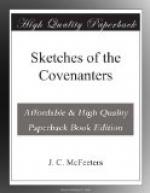9. What special advantages have we for serving God?
XXXI.
Indulgence, the six-fold snare.—A.D. 1665.
The Covenanters, after the Pentland Rising, were placed under martial law. Every district was garrisoned and overrun with troops. The military, having been empowered to plunder, pillage, and punish at their caprice, did not hesitate to shoot down innocent people without trial, leaving them weltering in their own blood. King Charles accounted the Covenanters rebels to be subdued with fire and sword. He was determined upon their subjection, or destruction. “Better,” said one in his service, “that the land bear whins than whigs.” The Covenanters were called whigs; the whins were worthless bushes.
The Covenanters rebels! Be it remembered that Scotland was under a Constitutional government, and the Constitution was embodied in the Covenant. Also, the king and the people had accepted the Covenant on oath. Yet in the face of all this, King Charles attempted to rescind the Covenant, destroy the Constitution, and assume absolute power. Ah, was not Charles the rebel? Was not he the traitor, the revolutionist, the autocrat who attempted to turn things upside down? The Covenanters were the Old Guard, who stood for law, justice, government, and constitutional rights, on the accepted basis—God’s law and Covenant. Nor did the Old Guard ever yield the field; they occupy it yet.
True, the Covenanters did decline the king’s authority in certain particulars! But were they not justifiable? A glance at the situation will solve the question.
The king, having expelled the Covenanted ministers, substituted others of his own choice. The Covenanters refused to hear them.
The king restricted the Covenanters to their own parishes in public worship. They went where they pleased.
The king forbade marriages or baptisms, except by Episcopal ministers. The Covenanters went to their own ministers for these services.
The king ordered them to observe the Episcopal form of worship. They believed this to be unscriptural, and refused.
The king commanded the people to deliver up their ministers to the authorities for punishment. This they would in no wise do.
The Covenanters rebels, because they declined the king’s authority in matters like these? How could they have done otherwise? Two courses lay before them; resist the tyrant’s will, or submit as his slaves. Blessed be the Lord Jesus Christ, who gave them light, strength, courage, and victory. These fathers of the Covenant chose to suffer and be free; to endure the king’s wrath and keep a pure conscience; to disdain every suggestion of compromise and continue the conflict. The invitation to come down, and consult on the plains of Ono, was answered by its own echo—O, no.




